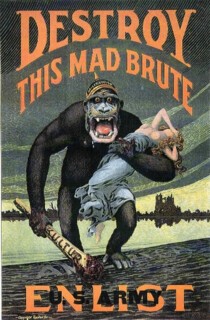Get friends, get weapons
Jonah Miller
According to Michael Gove writing in the Daily Mail last week, the First World War ‘has, for many, been seen through the fictional prism of dramas such as Oh! What a Lovely War, The Monocled Mutineer and Blackadder, as a misbegotten shambles’. We watched Blackadder Goes Forth at school. Digging out my old exercise books to find out what else we did, I see that I studied the First World War for a few months in year 9, when I was 14, covering four areas: the causes (plural) of the war, trench warfare, government propaganda and ‘those who wouldn’t fight’ – all no doubt evidence to Gove of the left-wing hijacking of history.
I found a diagram I’d drawn to answer the question ‘How does a war start?’ First a disagreement or argument, then an arrow taking you to ‘abuse, antagonism, rumour, threats’, which lead in turn to the final stages: ‘get friends/allies, get weapons, flashpoint’. I’d also drawn a comic strip considering such factors as ‘industrial output competition’ and ‘problems in the Austrian empire’. ‘Colonial rivalry’ was depicted by an angry stick-man saying ‘I’m the Kaiser and I want Morocco!’ to a stick-man with elaborate moustaches (French, presumably) and another with glasses, cigar and top hat (British). Even this seems a bit more sophisticated than Gove’s rehashing of H.R. Hopps’s 1917 American recruitment poster, ‘Destroy This Mad Brute – Enlist’.
Gove singled out Richard J. Evans in his attack on the ‘left-wing academics all too happy to feed those myths’ perpetuated by such insidious propaganda as Blackadder. Evans replied to Gove in the Guardian yesterday. In a piece criticising the education secretary and ‘the Tory Interpretation of History’ in the LRB three years ago, he wrote that ‘the demand, really, is for a celebratory history.’
In the Mail, on the other side of no man’s land, Gove regretted ‘an unhappy compulsion on the part of some to denigrate virtues such as patriotism, honour and courage’, insisted that ‘those who fought were not dupes but conscious believers in king and country, committed to defending the western liberal order’, and celebrated ‘Britain’s special tradition of liberty’.
I imagine Gove would approve of Robert Gambles, who writes in Great Tales from British History: Was Queen Victoria Ever Amused? And 39 Other Intriguing Historical Questions Answered of a ‘need to create a new understanding of our national identity, in an age when we have lost our imperial supremacy and self-confidence and when even the concept of British nationhood is challenged.’ Gambles sets out to investigate the truth of the stories that once formed the core of our island story (Alfred’s cakes, Dick Whittington’s cat, Victoria’s non-amusement) but insists that ‘once examined’ – and found to be baseless – ‘they should be left free to fly.’ His bugbear is ‘accurate scientific history’ or ‘real, solemn history’, which has killed off the old ‘readable and coherent narrative liberally embellished with anecdotes of kings, queens and heroic figures’ so ‘essentially and indisputably English’.
When even those who love the old jingoistic narrative accept, however unwillingly, that it has little basis in fact, Gove might consider how he is going to ‘get friends/allies’ in his battle with Evans and the cohorts of solemn historians.

Comments
Christopher Clark's book has been given a lot of praise but I'm afraid he falls down on what my history teacher used to say about long-term and short-term causes. His book seems to me to be a collection of topics that he has tied together with a nice red ribbon. Nothing wrong with re-evaluating of course but I am inclined to agree with Fritz Fischer and the view that if Germany started planning a war on two fronts in 1904 that this influenced the whole issue of German foreign policy. (I taught History to one of Schlieffen's family - she brought in some documents written by her ancestor. It was a great lesson!)